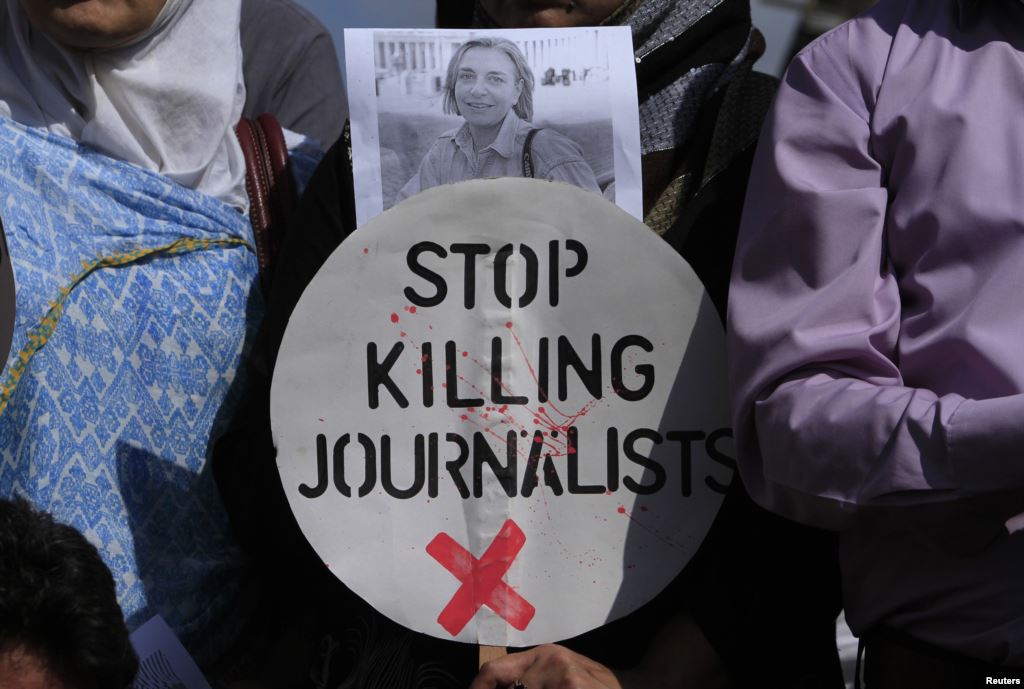'Stop Reporting' Or We Will Kill You'
Stop Killing Journalists
NEW DELHI: Rights groups including the Committee to Protect Journalists and Human Rights Watch have] condemned the brutal attack on a minibus in Kabul transporting journalists affiliated with Tolo TV, Afghanistan’s 24-hour news channel, on January 20.
"Attacks aimed at crushing independent media organizations in Afghanistan are a direct assault on the very foundation of Afghan democracy--a free and open press," said Bob Dietz, CPJ's Asia program coordinator. “The killings not only underscore the vulnerability of the media in the country, but the fragility of Afghan security under which the media must operate. We call on the government to seek out and prosecute the perpetrators of this crime as quickly as possible."
According to CPJ, this has been the most deadly three year period for journalists in Afghanistan, with international journalists killed at a very high rate.
Human Rights Watch cautioned that such attacks were designed to undermine Afghanistan’s still-fragile media freedom.
Both the Taliban and an individual who claims to represent a group that affiliates with the Islamic State have claimed responsibility for the attack, which killed seven journalists from the entertainment channel Tolo TV and its production wing, and injured 25 others, including bystanders. A Pashto-language Taliban statement described the bombing as “revenge” for alleged “false allegations” against the insurgency group. The statement explicitly listed both Tolo TV and its news channel rival 1TV as “military targets” for allegedly serving as “informational warfare tools of the American and Crusading forces.”
“The targeting of journalists reflects a depraved strategy to make media freedom a casualty of the ongoing conflict,” said Patricia Gossman, senior Afghanistan researcher. “Designating journalists and other civilians as ‘military targets’ does not make them so, and deliberately attacking them constitutes a war crime.”
Tolo TV and 1TV are among the most-watched networks in Afghanistan. They often broadcast heated talk shows, hard-hitting investigative reports, and breaking news from the front lines of the conflict. They are part of a media expansion in Afghanistan that many consider among the country’s major recent achievements. In a December 2014 statement, the Taliban explicitly threatened to attack any journalists seen as supporting “Western values.” That same month, Afghanistan’s chief executive officer, Abdullah Abdullah, pledged decisive action to protect journalists from attack and to prosecute those responsible for such abuses.
Afghan journalists have faced increasing intimidation and violence from both state and non-state figures in recent years. Journalists are vulnerable to threats, intimidation, and violence, particularly in relation to reporting on sensitive issues – including corruption, land grabbing, violence against women, and human rights abuses. Journalists working outside the country’s main cities are especially vulnerable to reprisals from powerful individuals and groups because they lack the protection provided by larger Afghan media organizations and international presence.
The Taliban and other insurgent groups have also used the media as a propaganda platform, and actively court the media in their campaign against the government, including pressuring reporters to cover their statements or not to write articles deemed critical.
“Afghan insurgents should respect the right for journalists to operate without fear for their lives from deliberate targeted attacks,” Gossman said. “So long as insurgents falsely categorize journalists as ‘military targets,’ media freedom in Afghanistan is in peril.”
In 2015, HRW had released a report, titled “‘Stop Reporting or We’ll Kill Your Family’: Threats to Media Freedom in Afghanistan,” documented harassment, intimidation, and attacks on journalists and the Afghan government’s failure to investigate and prosecute those responsible. The failure to protect journalistic freedom has emboldened those determined to suppress criticism of the government, the security forces, and other powerful entities in Afghan society, the report said. It added that the Taliban insurgency has greatly contributed to the climate of fear by explicitly targeting journalists for reporting deemed unfavorable. The government should act decisively to end the violence and intimidation, and the Taliban should end its attacks on civilian organizations, including the media.
Read the full statement here:
https://www.hrw.org/news/2016/01/21/afghanistan-attack-journalists-threatens-media-freedom





